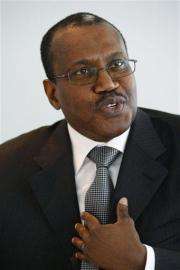Interview: UN telecoms chief urges data sharing

(AP) -- BlackBerry's Canadian manufacturer should give law enforcement agencies around the world access to its customer data, the U.N. technology chief said, adding that governments have legitimate security concerns that should not be ignored.
Hamadoun Toure, secretary-general of the International Telecommunication Union, said officials fighting terrorism had the right to demand access to users' information from the maker of the BlackBerry - Research in Motion Ltd.
"Those are genuine requests," he told The Associated Press in an interview Wednesday. "There is a need for cooperation between governments and the private sector on security issues."
RIM is embroiled in parallel disputes with at least five countries - India, Indonesia, Lebanon, Saudi Arabia, and the United Arab Emirates - over concerns that the smart phone's powerful encryption technology could be used as a cover for terrorism or criminal activity.
Civil libertarians have argued that the controversy is fueled by authoritarian governments' frustration over their inability to eavesdrop on BlackBerry-using citizens.
Blackberry service is designed from the ground up for secure communications. RIM says it complies with all legal requests for data - such as phone logs - even it is unable to provide anyone with the text of e-mails sent by people using its corporate service.
Governments in the U.S. and Europe have largely made their peace with encryption technology, but officials in Asia and the Middle East have demanded that RIM modify its practices to allow them wholesale access to BlackBerry e-mails as they're being transmitted.
On Thursday, Indian officials widened their security crackdown, asking all companies that provide encrypted communications - not just RIM - to install servers in the country to make it easier for the government to obtain users' data. That could potentially draw companies such as Skype and Google into the flap.
RIM has effectively thrown up its hands, saying the way the Blackberry system is designed prevents anyone except its clients from decrypting communications. The impasse has sent the company's share price plummeting.
A company representative in London did not immediately respond Thursday to a request for comment on Toure's remarks.
Toure's organization is responsible for coordinating the use of the global radio spectrum, promoting international cooperation in assigning satellite orbits, and establishing standards for the telecommunications industry. The little-known body also serves as a global forum for discussion of cutting-edge communications issues.
The agency has no independent regulatory power, but Toure's comments are a barometer of sentiment among the agency's 192 member states, which are expected to re-elect him to a second term later this year.
Toure was in the British capital to drum up private investment for an effort to spread broadband coverage across the globe. He has argued that hooking developing countries up with high-speed Internet access can have huge additional benefits, boosting education, business, health care and other issues.
Toure has gathered business and political leaders to form a Broadband Commission for Digital Development, a high-profile group devoted to lobbying governments for broadband-friendly regulations. The commission delivers its report to the United Nations later this month.
In the interview, Toure also fielded questions about network neutrality and allegations of Iranian interference with foreign satellite broadcasts.
Toure declined to explicitly say whether he backed network neutrality, the principle that Internet service providers should treat all Internet traffic equally. Some service providers argue that, having invested billions on their networks, they should be allowed to manage Internet traffic as they see fit - for example by giving priority to their own content, preventing applications such as file-sharing from hogging bandwidth, or creating premium services that charge more for faster access.
Toure expressed opposition to attempts to create a two-tier Internet with fast and slow lanes, telling companies they should focus on "ensuring that the best quality signal is offered to anyone, including your competitors."
He also said talks between satellite provider Eutelstat and the Iranian government were ongoing following allegations that Iran had jammed foreign signals following its disputed presidential vote last year.
Western media said Tehran had obstructed their broadcasts to choke off coverage of the unrest that followed President Mahmoud Ahmedinejad's re-election to a second term, and the European Union has taken its case to Toure.
Toure said the parties have been in talks at his office in Geneva as recently as Monday, but would not reveal any details.
"We don't see it as a big crisis," he said. "It will be resolved."
More information: http://www.itu.int/
©2010 The Associated Press. All rights reserved. This material may not be published, broadcast, rewritten or redistributed.



















